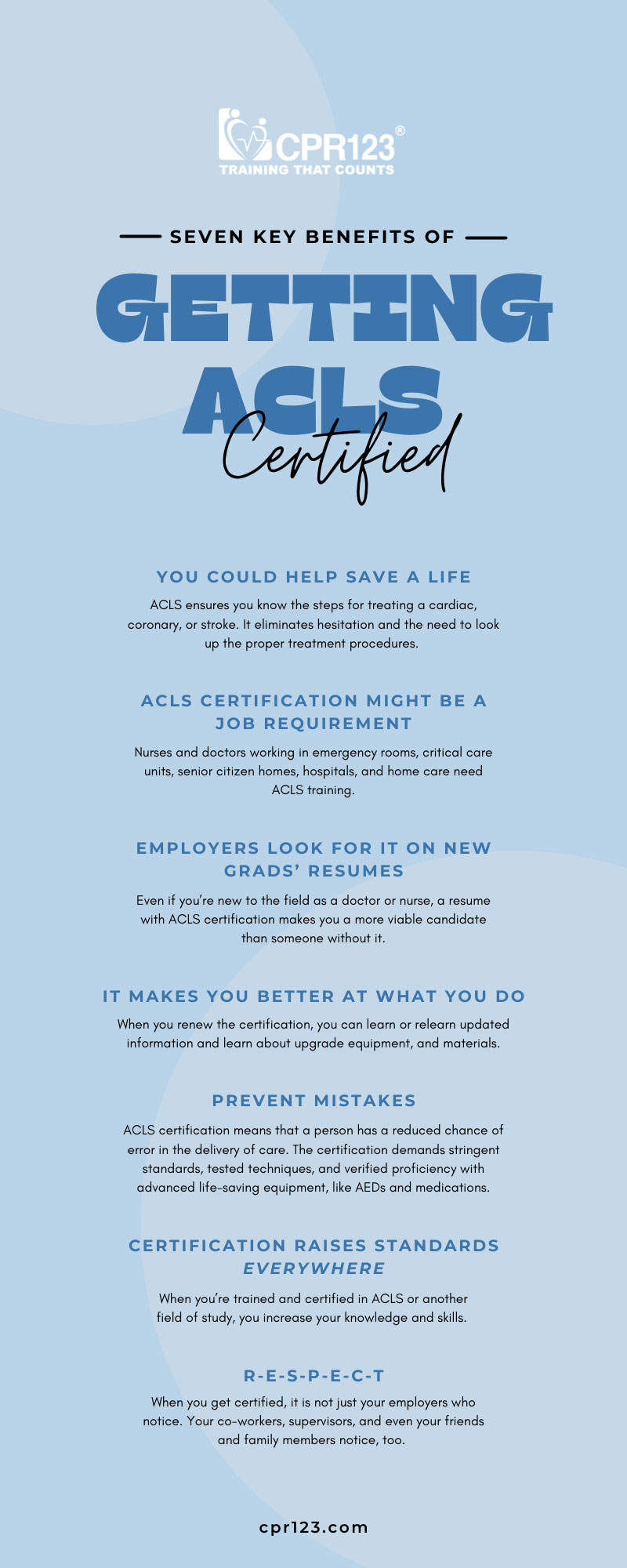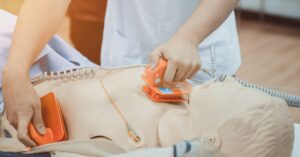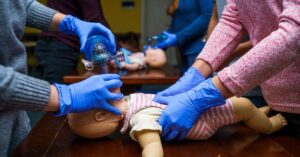Advanced cardiac life support, or ACLS, ranks high in the list of skills a doctor, nurse, or other healthcare professional needs to have under their belt. Considered by some to be the next tier after basic life support (BLS) training, ACLS provides a set of structured steps for treating and supporting patients suffering from fatal cardiovascular conditions.
Patients experiencing cardiac arrest, of course, need providers who are versed in ACLS but so do those who experience strokes, coronary syndromes, and other conditions. ACLS trainees receive instruction in cardiopulmonary resuscitation (CPR), basic life support (BLS), the use of automated external defibrillators (AEDs), airway management, pharmacology related to ACLS, reading ECGs, and more. ACLS training is primarily for doctors, nurses, emergency room medical personnel, paramedics, and physician assistants. Knowledge of ACLS is usually a necessary skill for their positions. But ACLS training and certification is so much more than that. Here are the seven key benefits of getting ACLS certified and how they can help in your career and life in general.
You Could Help Save a Life
Undoubtedly, the biggest and best reason to train in ACLS is that the time may come where seconds count, and your ability to help sustain a person suffering from cardiac arrest or something similar could be the deciding factor in whether they live, die, or live with a debilitating condition. ACLS ensures you know the steps for treating a cardiac, coronary, or stroke. It eliminates hesitation and the need to look up the proper treatment procedures. You’ll have the latest equipment and knowledge. Awareness and proper medical knowledge make you a greater asset as a doctor or nurse in your hospital or healthcare facility, or as a paramedic on an emergency call.
ACLS Certification Might Be a Job Requirement
The next of the seven key benefits of getting ACLS certified is that certification might be a requirement for staying employed. Nurses and doctors working in emergency rooms, critical care units, senior citizen homes, hospitals, and home care need ACLS training. If you need ACLS certification as part of your job, then get it soon.
Employers Look for It on New Grads’ Resumes
If you recently graduated from medical or nursing school, be ACLS certified sooner than later (if you aren’t already). Most hospitals, ERs, critical care facilities, and similar healthcare facilities that deal with emergency medicine or need to deliver life-sustaining treatments require trained personnel with ACLS certification. Even if you’re new to the field as a doctor or nurse, a resume with ACLS certification makes you a more viable candidate than someone without it.
It Makes You Better at What You Do
Getting ACLS certification isn’t a one-and-done type of deal. You’ll need to renew your certification and knowledge eventually— every two years on average. When you first participate in the training and testing involved in ACLS certification, you’ll learn how to use the right equipment and treatments to save lives by swiftly and accurately diagnosing and helping patients. That way, they can heal quickly or at least have a fighting chance to recover. When you renew the certification, you can learn or relearn updated information and learn about upgrade equipment, and materials.
Prevent Mistakes
Unlike many jobs, positions in the healthcare profession don’t allow for mistakes. Whereas a salesperson might not make enough sales, or an editor might miss a lot of typos, there are just two results for improper healthcare: greater injury and trauma, or death. Healthcare has a steep learning curve, so you need to enter the profession with a great deal of lifesaving knowledge and the confidence and intelligence to use it correctly. ACLS certification means that a person has a reduced chance of error in the delivery of care. The certification demands stringent standards, tested techniques, and verified proficiency with advanced life-saving equipment, like AEDs and medications. When review time comes, you don’t want to have a list of lost or hurt patients or conditions that lead to disciplinary action.
Certification Raises Standards Everywhere
When you’re trained and certified in ACLS or another field of study, you increase your knowledge and skills. You then bring that higher standard of knowledge and performance to your workplace, serving as an example and a source of information and training for coworkers who may be inspired to seek their own certification. This causes a ripple effect of professionalism and education that can extend well beyond the walls of your place of employment. It can also influence word of mouth, marking your facility as a trustworthy place staffed by a better and smarter class of professionals. Seeking and sharing knowledge rarely has drawbacks, especially to society at large!
R-E-S-P-E-C-T
When you get certified, it is not just your employers who notice. Your co-workers, supervisors, and even your friends and family members notice, too. Admittedly, you might need to point it out to them (if not outright explain why ACLS and other training is important), but they’ll understand afterward. They could even end up admiring you.
You might consider serving in the role of cheerleader for greater overall training in your facility as well. After getting certified, talk to your supervisor about pushing for more training and certification for everyone. Volunteering to organize, promote, and arrange training for others is one more way to get the kind of noticeability you want at your job. It also makes you look like leadership material.
If you are interested in learning more about ACLS courses, BLS, CPR, and other forms of medical certification, contact us and we’ll be happy to discuss your in-person and online course options.








